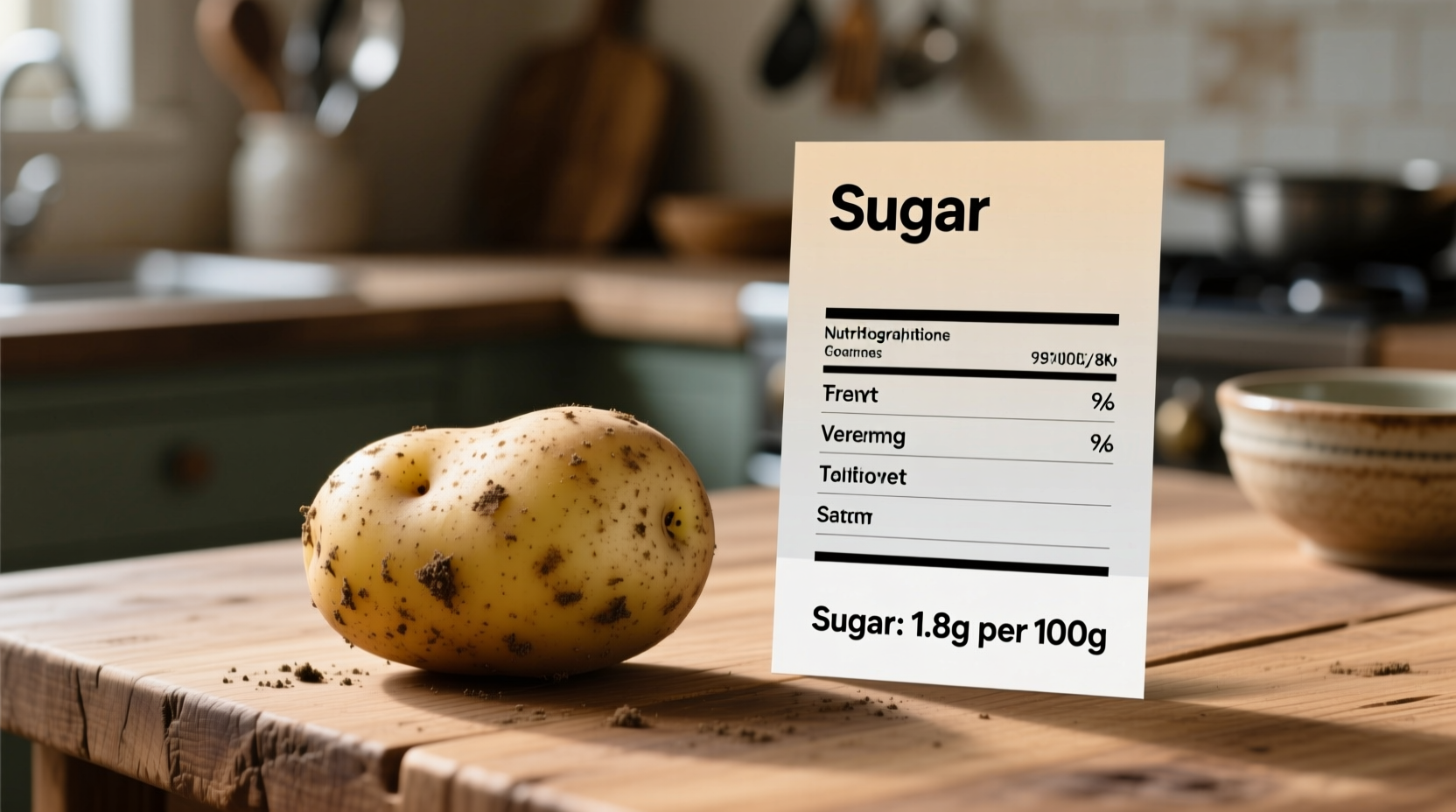Yes, potatoes do contain natural sugars, but in relatively small amounts compared to their starch content. A medium raw potato (150g) contains approximately 1.2g of sugar, while starch makes up about 26g of its carbohydrate content. The primary sugars in potatoes are glucose and sucrose, which occur naturally in the tuber.
When evaluating potatoes for your diet, understanding their precise sugar composition helps make informed nutritional decisions. Despite common misconceptions, potatoes aren't high-sugar vegetables, but their carbohydrate profile affects blood sugar differently than many other vegetables.
Understanding Potato Composition: Sugar vs. Starch
Potatoes are primarily starchy vegetables, but they do contain small amounts of natural sugars. The confusion often arises because people equate "starchy" with "sugary," but these are different carbohydrate types with distinct metabolic effects.
According to the USDA FoodData Central, here's the complete carbohydrate breakdown for 100g of raw potato:
| Carbohydrate Type | Amount per 100g | Percentage of Total Carbs |
|---|---|---|
| Total Carbohydrates | 17g | 100% |
| Sugars (glucose, sucrose) | 0.8g | 4.7% |
| Starch | 15.9g | 93.5% |
| Dietary Fiber | 2.1g | 12.4% |
This composition explains why potatoes have a moderate glycemic index (around 78 for boiled white potatoes), meaning they affect blood sugar more quickly than non-starchy vegetables but less rapidly than pure sugar sources.
How Different Potato Varieties Compare
While differences are relatively small, certain potato varieties contain slightly varying sugar levels:
| Potato Variety | Sugar Content (per 100g) | Notes |
|---|---|---|
| Russet | 0.6g | Highest starch content, ideal for baking and frying |
| Yukon Gold | 0.9g | Slightly sweeter taste due to higher sugar content |
| Red Potatoes | 1.0g | Firm texture with slightly higher sugar content |
| Sweet Potatoes | 4.2g | Significantly higher sugar content than white potatoes |
Sweet potatoes contain substantially more natural sugars than white potato varieties, explaining their sweeter taste. However, they also provide more fiber and vitamin A.
How Cooking Methods Affect Sugar Content
Preparation methods influence sugar composition and metabolic impact:
- Boiling: Causes minimal change to sugar content, though some sugars may leach into cooking water
- Baking: Concentrates sugars slightly as moisture evaporates
- Frying: At high temperatures, sugars react with asparagine to form acrylamide
- Cooling after cooking: Creates resistant starch, which behaves more like fiber and reduces glycemic impact
Research published in the Journal of Agricultural and Food Chemistry shows that cooling cooked potatoes for 24 hours can increase resistant starch content by up to 75%, effectively reducing their glycemic impact.
Practical Implications for Different Dietary Needs
For Blood Sugar Management
The American Diabetes Association recommends:
- Pairing potatoes with protein and healthy fats to slow glucose absorption
- Choosing smaller portions (½ cup cooked)
- Opting for cooled cooked potatoes to increase resistant starch
- Considering alternatives like sweet potatoes or cauliflower
For Low-Carb Dieters
Traditional potatoes generally don't fit strict low-carb diets due to their total carbohydrate content (approximately 37g per medium potato). Consider:
- Using small portions of cooled potatoes for resistant starch benefits
- Choosing lower-carb alternatives like radishes or turnips
- Focusing on non-starchy vegetables
For General Health
When prepared healthily (baked, boiled, or steamed), potatoes provide valuable nutrients:
- Potassium (more than bananas)
- Vitamin C
- B vitamins
- Dietary fiber (especially with skin)

Putting Potato Sugar in Context
Comparing potato sugar content with other common foods provides valuable perspective:
| Food Item | Sugar Content (per 100g) | Total Carbohydrates (per 100g) |
|---|---|---|
| Raw White Potato | 0.8g | 17g |
| Carrots | 4.7g | 9.6g |
| Beets | 6.8g | 9.6g |
| Apple | 10.4g | 13.8g |
| Tomato | 2.6g | 3.9g |
| Broccoli | 1.7g | 7g |
This comparison shows potatoes contain less sugar than many common vegetables relative to their total carbohydrate content. The key difference is potatoes' higher total carbohydrate content due to starch.











 浙公网安备
33010002000092号
浙公网安备
33010002000092号 浙B2-20120091-4
浙B2-20120091-4